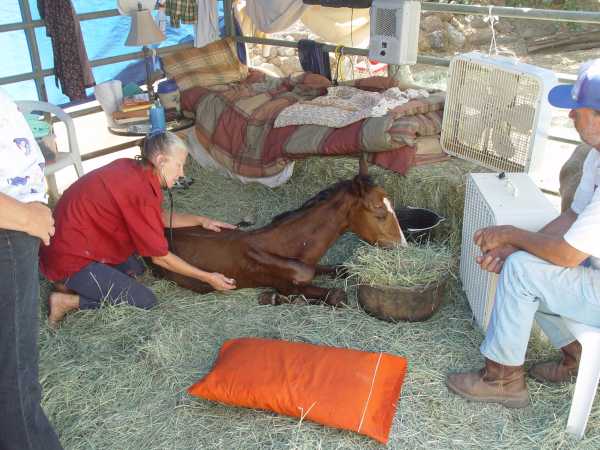LRTC's Lucky Horse Rehabilitation Project in Dayton, NV receives orphan foals found out on the Virginia Range and from BLM ranges and facilities. Occasionally orphans come from other sources sucg as allied rescue groups. They are cared for by LRTC's Adoption Program Manager Shirley Allen and her team of volunteers. Since they can become pretty tame while being cared for, most of these foals are eventually placed with qualified adopters.
Shirley exercises little Tulip, found injured by workers at the Lockwood Landfill.

Foals can get orphaned in a number of ways. Some foals are born too early in the year, cannot maintain their body heat when nighttime temperatures plunge, and they can't keep up with their bands. Usually the bands will try to stay with a struggling foal, however human activities, especially when local residents get up in the morning and start heading to work, often send the bands for cover and they occasionally leave a foal behind.
Nursing mares occasionally get injured or ill and can't nurse their foals.
Trucker was found standing next to his mom who had died of West Nile Virus.

Occasionally a foal will get injured when two stallions fight over its mother. If stallions get into a serious testosterone charged battle, they don't pay much attention to whom or what they strike out at.
Little Ozzie got between two fighting stallions and was severely mauled.

Sometimes the weather can separate foals from their dams. For example, a recent lightning storm caused a small range fire and scattered one of the larger wild horse bands. A foal showed up by herself where the horses usually watered. Unfortunately the local coyotes also frequented the area.
Sally in a range holding corral in hopes her band would return.

We will try to reunite a wayward foal with its band if the foal is strong enough and if we can positively identify the foal's dam. However as a practical matter if we can not reunite the foal and mare within 24 hours, the likelihood of the foal surviving sharply declines and the foal will generally be cared for at our Dayton facility.
Criteria for placing foals with adopters
- The foal must be healthy and eating primarily solid food.
- Adopters must have proper shelter and fencing.
- Adopters must have a mature horse with which the foal can socialize.
- It is preferable that adopters have some direct experience raising foals.
Heidi meets some prospective adopters.

The most significant problem associated with placing an orphan foal involves the horse's behavior. Orphans receive a great deal of attention while being nursed back to health, then they have to learn to be horses. An 800 Lb. horse that still has a baby's view of the world can be downright dangerous. Therefore it is important that the foal grow up interacting with adult horses and that the adopters help correctly guide the young horse's attitude as it passes through several emotional stages.
The volunteers invest a huge amount of time in rehabilitating and caring for the orphans and placing them with the best possible adopters. This experience can produce a great deal of stress and heartache.
Volunteers check a foal's vital signs in the "M*A*S*H corral."

In spite of the difficulties involved, satisfaction is great each time an orphan successfully integrates into an adopter's "family" and has a life-long home.
Nemo's dam broke her leg and had to be euthanized and he was actually delivered
by caecerean section. Nemo has since become a successful parade and saddle horse.

Each foal saved eventually becomes a valued "member" of an adopted family. The foal benefits, the adopters benefit and even our agricultural economy benefits since these adopters have made the conscious decision to invest a portion of their disposable income directly back into the agricultural sector when they purchase hay, supplements, supplies and equipment and they hire the services of local trainers, farriers and veterinarians. Plus with every foal we save, we preserve another tiny piece of Nevada's incredible history.
Victoria, 2005 Western States Wild Horse & Burro Expo Champion Halter Horse.
Victoria was orphaned when her dam was sold for slaughter.

The t-shirt Victoria is wearing reads, "AMERICANS DON'T EAT HORSES! Support HR 503."
|










